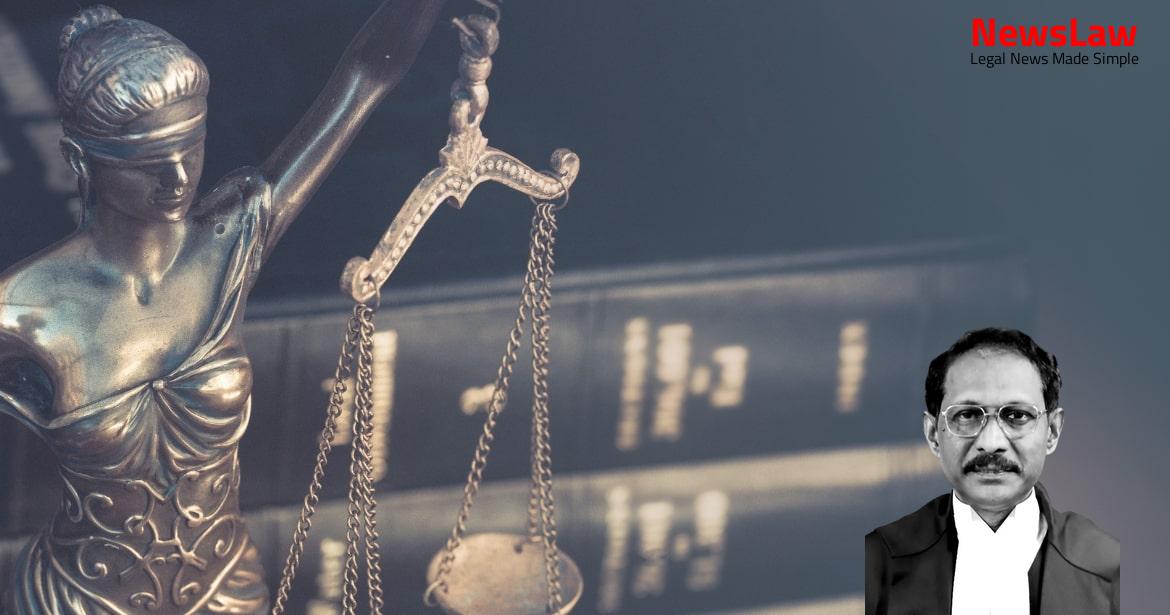232 OF 2023 (Arising from SLP(Civil)
No 3915/2022) CIVIL APPEAL NOS.216-217 OF 2023 (Arising from SLP(Civil) Nos. By the impugned judgment(s) and order(s) passed by the High Court, the High Court has dismissed the revision applications preferred by the revenue – State of Karnataka and as such has allowed the Input Tax Credit (hereinafter referred to as the ‘ITC’) claimed by the respective purchasing dealers.
However, the Karnataka Appellate Tribunal reversed the orders passed by the Assessing Officer as well as the first Appellate Authority on the ground that the purchasing dealer should not suffer due to default of seller.
Upon finding some irregularities in Input Tax Rebate claimed by the purchasing dealer for Assessment Year 2010-2011, the Assessing Officer issued notice under section 39 of the KVAT Act, 2003 seeking furnishing of accounts, books, tax invoices etc. Shri Nikhil Goel, learned AAG appearing on behalf of the State has vehemently submitted that in the facts and circumstances of the case, the High Court has materially erred in dismissing the revision applications and confirming the respective orders passed by the Appellate Authorities in allowing the Input Tax Credit in favour of the respective purchasing dealers. It is submitted that mere production of invoices or even payment to the seller by cheque cannot be said to be sufficient and may not be said to discharging the burden to claim Input Tax Credit, to be discharged under Section 70 of the KVAT Act, 2003. 742 of 2013 and other allied tax appeals against which also the special leave petition has been dismissed, however, keeping the question of law open and has also relied upon another decision of the Gujarat High Court in the case of Shreeji Impex Vs. It is submitted that therefore, for the purposes of Input Tax Credit, the purchasing dealer has to prove the actual payment of tax and actual transfer of goods and mere paper transaction is not sufficient. It is submitted that therefore once the dealer has discharged the burden cast under Section 70 of the KVAT Act,2003, the purchasing dealer is entitled to the Input Tax Credit and if at all it is found that a tax is not paid by the seller, the same can be recovered from the seller. It is further submitted by the learned counsel appearing on behalf of the respective assessees / dealers that the only requirement of law, as far as the purchasing dealers wanting to avail the benefit of Input Tax Credit is concerned, is that he has to make sure that the selling dealer is a registered dealer and has issued the tax invoice in compliance with the requirement of the KVAT Act and the Rules made thereunder.
It is submitted that denial of ITC to a purchasing dealer who has taken all the necessary precautions fails to distinguish such a diligent purchasing dealer from the one that has not acted bonafide. The Assessing Officer, on appreciation of evidence and considering the other material on record, doubted the genuineness of the transactions and the purchases made from the respective dealers and denied the ITC. 1 Therefore, the short question which is posed for the consideration of this Court is, “whether, in the facts and circumstances of the case, the second Appellate Authority as well as the High Court were justified in allowing the Input Tax Credit?” While considering the aforesaid issue/question, Section 70 of the Karnataka Value Added Tax Act, 2003 is required to be referred to, which reads as under: “.70 Burden of proof.- (1) For the purposes of payment or assessment of tax or any claim to input tax under this Act, the burden of proving that any transaction of a dealer is not liable to tax, or any claim to deduction of input tax is correct, shall lie on such dealer. (3) Before issuing any direction for the payment of the penalty under this Section, the prescribed authority shall give to the dealer the opportunity of showing cause in writing against the imposition of such penalty.” 9.1
Thus, the provisions of Section 70, quoted hereinabove, in its plain terms clearly stipulate that the burden of proving that the ITC claim is correct lies upon the purchasing dealer claiming such ITC. The dealer claiming ITC has to prove beyond doubt the actual transaction which can be proved by furnishing the name and address of the selling dealer, details of the vehicle which has delivered the goods, payment of freight charges, acknowledgement of taking delivery of goods, tax invoices and payment particulars etc.
Even considering the intent of section 70 of the Act, 2003, it can be seen that the ITC can be claimed only on the genuine transactions of the sale and purchase and even as per section 70(2) if a dealer knowingly issues or produces a false tax invoice, credit or debit note, declaration, certificate or other document with a view to support or make any claim that a transaction of sale or purchase effected by him or any other dealer, is not liable to be taxed, or liable to take at a lower rate, or that a deduction of input tax is available, such a dealer is liable to pay the penalty.
Also Read: https://newslaw.in/case-type/civil/acquisition-of-land-and-deemed-lapse-under-the-act-2013/
If the purchasing dealer/s fails/fail to establish and prove the said important aspect of physical movement of the goods alleged to have been purchased by it/them from the concerned dealers and on which the ITC have been claimed, the Assessing Officer is absolutely justified in rejecting such ITC claim. At the cost of repetition, it is observed and held that unless and until the purchasing dealer discharges the burden cast under Section 70 of the KVAT Act, 2003 and proves the genuineness of the transaction/purchase and sale by producing the aforesaid materials, such purchasing dealer shall not be entitled to Input Tax Credit.
As observed hereinabove, over and above the invoices and the particulars of payment, the purchasing dealer has to produce further material like the name and address of the selling dealer, details of the vehicle which has delivered the goods, payment of freight charges, acknowledgement of taking delivery of goods including actual physical movement of the goods, alleged to have been purchased from the concerned dealers. No so far as the reliance placed upon Rules 27 and 29 of the Karnataka Value Added Tax Rules, 2005 and the submission on behalf of the purchasing dealers that under the provisions of the Rules 2005, more particularly under Rules 27 & 29, the only requirement is to issue the tax invoice and to produce the same and there is no other requirement is concerned, the aforesaid has no substance.
Government of NCT of Delhi (Writ Petition (Civil)
Also Read: https://newslaw.in/case-type/civil/taxation-of-engineering-design-drawings-goods-or-services/
No 6093/2017, decided on 26.10.2017), relying upon by the learned counsel appearing on behalf of the purchasing dealers is concerned, at the outset, it is required to be noted that before the Delhi High Court, Section 9(2)(g) of the Delhi Value Added Tax Act was under consideration, which reads as under: “9(2)(g) to the dealers or class of dealers unless the tax paid by the purchasing dealer has actually been deposited by selling dealer with the Government or has been lawfully adjusted against output tax liability and correctly reflected in the return filed for the respective tax period.” The burden of proof as per Section 70 of the KVAT Act, 2003 was not an issue before the Delhi High Court.
Case Title: THE STATE OF KARNATAKA Vs. M/S. ECOM GILL COFFEE TRADING PRIVATE LIMITED (2023 INSC 212)
Case Number: C.A. No.-000230-000230 / 2023



